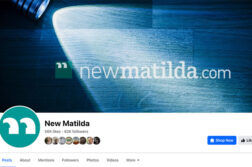I've been a reader of New Matilda since 2004 and more recently an occasional reporter. So I am excited to take on the role of contributing editor, through which I can not only do my own reporting but also work with other members of the New Matilda team to build a strong independent media organisation.
There has always been a need for more independent media in Australia but never has that need been more critical than now. The advertising that supported the editorial content in corporate print media largely evaporated with the growth of the internet. Mainstream editors confront the tricky task of using the remaining advertising to shore up as much journalism as possible. Inevitably this means that advertising will shape the broad contours of editorial content even more than before.
Recently it has been sad to watch so many strong and very experienced journalists leave their jobs. But what matters even more will be the inevitable gaps and silences they leave behind, especially at Fairfax Media, which over recent decades has been an important outlet for watchdog journalism. This does not mean there are no strong journalists or stories left, but what remains is vulnerable.
In Australia, this crisis adds to the burden of the neglected and pre-existing problem of concentration of the media. Recent research reported in the Finkelstein Independent Inquiry into the media found that out of 26 countries studied, Australia's media is the most concentrated media by a "considerable margin". Eighty six per cent of newspaper circulation is in the hands of News Corporation and Fairfax Media. Both companies hope that paywalls will supplement shrinking advertising income but whatever their CEOs tell shareholders, they are far from confident paywalling will work. Although 70 per cent of Australians when surveyed said they were concerned about media concentration, this issue and its consequences for the exercise of media power is ignored by the mainstream media, especially News Ltd publications.
None of this is surprising and no doubt makes good corporate sense. But it does make it difficult to have any sensible discussion about media policy. In fact, any fair discussion of the media itself depends on the public and independent media, including New Matilda.
Last week News Ltd Chief Executive Kim Wiliams suggested that the a proposed "public interest test" for shifts in ownership should be rejected because it could threaten the value of big media assets. But while lack of diversity might not suit News Ltd, it is a political problem for democracy. As British sociologist John B. Thompson wrote, the struggle to be "heard or seen (and to prevent others from doing so) is not a peripheral aspect of the social and political upheavals of the modern world; on the contrary, it is central to them".
Even if the Gillard Labor government did introduce a "public interest" ownership test to stop further concentration of major outlets, it may be too late to be effective. After all, the first call for action to address this issue came at the time of the 1981 Victorian Norris Inquiry. (You can find a New Matilda timeline of media regulation up to 2011 here.)
On the optimistic side, there has been growth of small independent online media covering a wider range of perspectives and stories. But as US-based technology writer Clay Shirky pointed out last week, during his campaign to save the innovative journalism project Homicide Watch, there are two sides to the crisis in media — one affects the mainstream, the other is that start-ups are also vulnerable. New Matilda is an important part of our Australian new media landscape but without support, it cannot prosper.
In the new media landscape, those who can afford something need to consider where to put our resources. A key factor that attracted me to become a New Matilda supporter is that if I contribute, everybody else will have access to our journalism. A reader-supported media outlet also means editors and reporters set their own agenda, independent of corporate and political pressure.
New Matilda sits within a long Australian history of independent media which has traditionally been a source of far more innovation and change than many realise. In these times of media crisis, there is a tendency to idealise the mainstream media past. My memory of being a student journalist in the late 1960s is that there was a yawning silence in established media about many issues including systematic prison bashings, domestic violence and rape, discrimination against gays, the conditions in which Indigenous Australians lived. Protests and strikes were routinely ignored or misreported. As movements for social change grew, alternative media made possible by less expensive and more accessible printing put pressure on these barriers around the news agenda, opening up spaces for more critical and open journalism.
In their recent call for your support, the editors listed 10 things which New Matilda does which no one else does. Among these is research-based accurate analysis. This is underpinned by values such as equity, social justice and sustainability, a refreshing break from the constant refrain of endless economic growth and consumption, mining futures, and balanced budgets. Then there are in-depth reports including editor Marni Cordell's investigation into Australia's role in funding elite Indonesian counter-terror unit Detachment 88, an issue finally taken up by the ABC recently, and the 2011 team investigation which made details of the Serco detention centre contract public. These reports require first hand observation, interviews and careful fact checking which takes time and resources.
You can become a supporter of New Matilda for less than $10 a month. You may be able to afford more. I am also a supporter of Reader Supported News, an aggregator of journalism of interest to progressive audiences. In an appeal for funds, it recently told supporters that research showed that the biggest reason people give for not making donations is that they simply don't get around to it. So don't be one of those people. Become a supporter but don't leave it there. We have more power over distribution than ever before. Become part of the New Matilda community by helping build our audience by tweeting and retweeting stories or sharing them on other social media.
You won't agree with all the articles — I don't — there would be a problem if you did. However, unlike some media, all New Matilda stories are open for comment. So make this commentary a worthwhile debate.
Whether corporate, independent or public, a key characteristic of journalism is that it makes truth claims. We aim for the highest standards. It you see a mistake tell us, so that it can be corrected. We are always interested in confidential information and investigative ideas, especially ones that could involve a team.
It's an illusion to pretend, as many commentators do, that success in getting your ideas and policies accepted depends on having the best communication or PR strategy. The fact is that the media playing field is not a fair or even one. When powerful interests decide to push a certain narrative or turn on a person, organisation or group, the going can be tough. That situation can only get worse if we do not have an independent media that opens up debate, speaks into the silences and gives voice to the marginalised.
Donate To New Matilda
New Matilda is a small, independent media outlet. We survive through reader contributions, and never losing a lawsuit. If you got something from this article, giving something back helps us to continue speaking truth to power. Every little bit counts.



